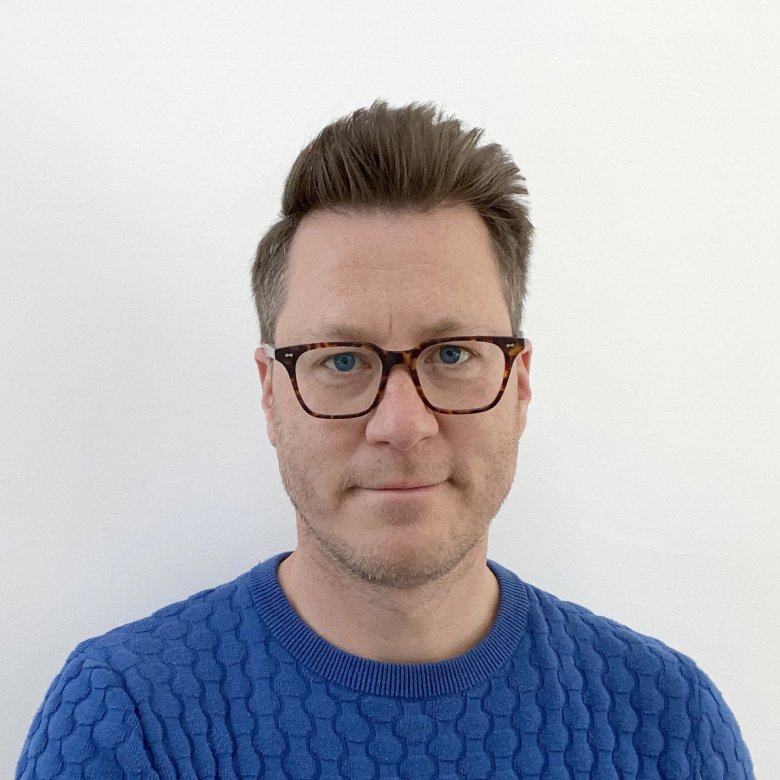Building a sustainable Fine Art career: in conversation with Ian Monroe
29 June 2021

After coming of age as an artist in the midst of the 2008 financial crash, course leader for Fine Art MA (Online) Ian Monroe discovered the secrets to becoming a resilient practitioner and building a sustainable art career.
“I want to help give students the tools they need to position their work, talk about their work and form strong networks.”
During an art career that has spanned the best part of two decades, Ian Monroe has learned that the path to success doesn’t move in a straight line.
Ian burst onto the arts scene in 2003 when he made his first ever sale to legendary art collector Charles Saatchi. The Saatchi Gallery also agreed to feature a large-scale exhibition of the work that Ian had created while studying his MA at Goldsmiths University.
The funding that Ian acquired during this period launched his career as a studio artist. His work was acquired internationally by major museums and institutions as well as private collectors. But the state of the world economy had other plans for his profession.
With the global financial crisis of 2008 taking its toll on arts funding across the world, even major galleries struggled to survive. The gallery that Ian was working with was no exception and his promising career as a studio artist took a hit.
As Ian reflects, “the global gallery I was working with closed; it had galleries in London, New York, Berlin and Zurich. Overnight, the whole thing collapsed.
Being positive and taking chances and not worrying too much leads to more positivity. It’s easy to get discouraged – I’ve got a whole file of rejection letters. But that’s all part of it.
“I remember asking myself: ‘what was I thinking?’ I had been totally reliant on one small segment of the art world. I’d placed all my eggs in the basket of being a studio artist and then it disappeared before my eyes.
The global recession brought about a period of reflection for Ian, who quickly realised that he’d neglected the groundwork that his MA had taught him. “All I was thinking about was ‘how do I make the next piece of work?’ – well, there’s a lot more to being a successful practitioner than that.
“As an artist, you’re making meaning in the world. And that means you’re creating conversation, debate, dialogue and the exchange of information. When the recession hit, I got more involved in that conversation. It was a fantastic, albeit tough, lesson to learn.”
Ian had to rebuild his career, only this time he was determined to do it sustainably. Over the course of the next ten years, Ian would interact with segments of the art world that he’d previously ignored. He wrote essays for art journals, started lecturing at universities, and successfully pitched for public art projects. The diversity of the work ignited Ian’s love for art in exciting new ways.
“What was really fantastic about this was I got excited about art again in a new way… suddenly I was working with architects or thinking about other people’s art for my writing.
“Teaching stretched my thinking, and I re-encountered ideas that I’d lost touch with – cutting edge ideas around art theory, philosophy and debate.
“It made my art practice far richer in the long run.”
But the rebuild took time, not least because Ian had to learn new ‘real-world’ skills on the job. It's these skills that Ian is excited to share with students on the Fine Art MA (Online).
“The way the world works for a lot of artists involves applying for grants and prize competitions. That means you’re being asked to present PDFs, videos and presentations that are succinct, interesting and capture your work.
“Those are very real-world skills. I had to learn a lot of that in front of a panel, trying to fight for public projects that I needed to win to pay my rent. The students on the Falmouth MA can learn it in a constructively critical environment that will feedback to them.
“On the Fine Art MA we will expect and demand that you think about how to apply for grants, how you get prizes and which segments of the art world you want to engage with.”
Ian goes on to explain that one of the big learning outcomes for the online Fine Art MA is communication. “Artists are traditionally introverted – which is absolutely normal – but the course helps you by giving you the tools to build that communication.
“I want to help give students the tools they need to position their work, talk about their work and form strong networks.”
So, what advice does Ian have for aspiring professional artists?
“Really stay focused on what you have in front of you that’s good. If you don’t spend time worrying (by comparing yourself to others), things will land in your lap. Being positive and taking chances and not worrying too much leads to more positivity. It’s easy to get discouraged – I’ve got a whole file of rejection letters. But that’s all part of it.”




